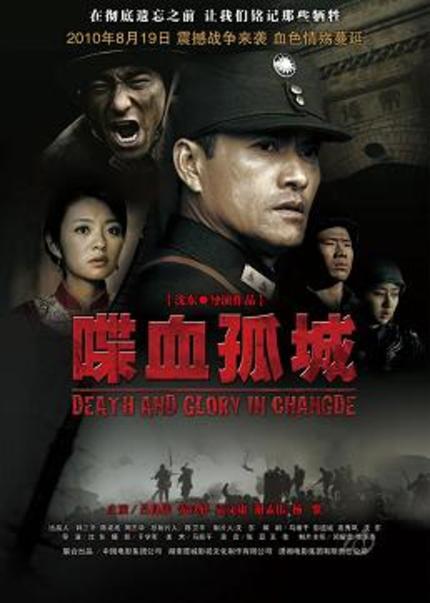DEATH AND GLORY IN CHANGDE review

The city of Changde was the focus of Japanese attempts to divert Chinese troops from more significant engagements during the Sino-Japanese war. It ended up liberated then retaken several times before Japanese troops finally retreated from the area in January 1944. Regardless of who actually won, the conflict was particularly grim, with the Japanese utilising multiple chemical and biological weapons, bombarding Changde with gas shells and dropping plague-bearing fleas into the city.
Death and Glory begins some way into the Japanese advance, with the Chinese army on the back foot. Outlying cities are falling one by one and Japanese troops flattening everything before them. The stage seems set for a last stand, with a handful of brave mainland soldiers heroically slaughtering the cackling Nipponese to the last man while a red flag flies in the background.
It's certainly predictable; we get the square-jawed officer in charge (Hong Kong veteran Ray Lui, Flash Point); the plucky ethnic minority character determined to show he can be a real soldier; not one but two young couples wondering if they'll live to get married, and generic key scenes lifted from countless war movies before it.
Yet in many ways Death and Glory is quietly impressive. It's a fairly slick piece of cinema, for starters - not quite up to the artistic gloss of something like Tiananmen, but the film radiates a warm, sepia-tinged glow that looks convincingly high-end. It's definitely hampered by lack of funds - battle sequences mostly comprise screaming Japanese charging the Chinese fortifications, say, without any showy camera flourishes or bird's-eye POV shots. Still, it's mostly real, embedded footage style rather than obvious CG, which helps immeasurably.
Astonishingly - given it's from the director of the wildly jingoistic On The Mountain of Taihang - Death and Glory is also refreshingly free of poisonous ethnic caricatures. It does resort to types; the Japanese are either paralysed by their devotion to the warrior ethic, ageing tigers sick of slaughter who can't get anyone to listen to them, sensitive poets trembling on the edge of shellshock or a bit of all three. But there's little or no cackling on either side, more a weary determination to get the job done. (And this after Taihang had a dying Japanese soldier elect to kill a saintly Chinese medic rather than get treatment.)
The cast give solid, if unexceptional performances across the board, all of which lends the whole thing a simple humanity most main melody films don't even bother with. When the Chinese general stops one of his officers from killing a subordinate who's cracked, begging to retreat, it actually feels as if this might be because he's a decent guy, rather than it being every man's duty to die for the motherland. Once the tribesman who signs up proves he's a crack shot, the troops treat him with respect, not a figure of fun or a mascot.
And war is portrayed as hell. Virtually no-one really wants to take part, and even the Japanese cheerleaders on the officer corps don't exactly act as if it's Christmas. Where Feng Xiaogang's Assembly and its undercurrent of 'China expects...' left a sour aftertaste, Death and Glory may be intended to honour the fallen but it doesn't make killing the Japanese seem like the greatest thing ever.
The defending troops are visibly terrified, howling in terror in the face of death, and with obvious reason. When the explosions kick in, they rock the camera, pyrotechnics satisfyingly over-the-top. Combat is ugly, targets coldly singled out, and when the two armies clash head-on scuffles in the trenches are savage and animalistic. Admittedly the character development does little more than a competent soap opera, but you find yourself empathising with even the most clichéd of the protagonists in the face of all this.
It is a soap opera, though, as many propaganda films are, and frustratingly Shen doesn't seem to be able to reconcile this with what actually happened. On top of the melodramatic excess so common in the genre, the film just... peters out, with the director trying to cast real life in a very different light (think 'tactical withdrawal' rather than 'run to the hills!'). All credit for not ignoring that Chinese troops did lose the city, but trying to pitch it on Stalingrad's level just cheapens the whole story.
Nonetheless, it'd be a shame were Death and Glory in Changde forgotten entirely. It's not a great film by any stretch, but provided you know what you're in for it is a good one, solidly made, entertaining chest-beating that's surprisingly emotional with more than a few gripping stretches of action. Don't expect City of Life and Death, but if you're after a tight, efficient mainland Chinese war movie that proves not all propaganda pieces need be tedious or offensive, Shen Dong's film comes recommended.

Do you feel this content is inappropriate or infringes upon your rights? Click here to report it, or see our DMCA policy.






